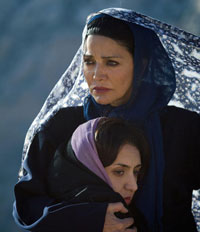 Contains some spoilers.
Contains some spoilers.
In 1986 Iran, in a remote village where the men manipulate, set, and enforce the laws based on their own version of Islamic teachings, one woman suffers a terrible, terrible consequence when her estranged husband decides to implicate her for adultery.
Based on a true story, “The Stoning of Soraya M.” relates the awful sequence of events that befall Soraya, a wife on the outs with her brutish husband. As the movie begins, Iranian village elder Zahra (“The House of Sand and Fog’s” Shohreh Aghdashloo) waylays a French-Iranian journalist passing through her village (“The Passion of the Christ’s” Jim Caviezel) and tells him the tragic story of her niece Soraya, beautifully played by Mozhan Marno.
As the story unfolds, Soraya is approached by the local cleric with an offer of divorce from her husband, Ali. Though she also wants out (because he abuses her and sleeps around), she knows she cannot care for herself and her children without him. Zahra begs her to leave him. But Soraya, who gets a job tending house for a local widower, won’t do so until she saves up enough money.
Ali, her husband, who is driven by his lust to marry a young girl, decides that if he cannot get a divorce from Soraya, he’ll just have her killed by framing her for adultery. Through a shameful sequence of events, Ali manipulates the mayor and cleric of the village to support his vendetta against Soraya. And as the title of the movie foretells, Soraya, is sentenced under a warped version of an Islamic law that calls for a person who commits adultery to be stoned to death. The final sequence of the film is an utterly painful, drawn-out scene that shows the actual stoning of Soraya M, leaving nothing to the imagination. Ever seen the flogging scene of Jesus Christ in Mel Gibson’s “The Passion of the Christ?” This is worse.
I had a horrible time watching that scene, knowing how Soraya was framed by flimsy evidence. She becomes a victim of mob mentality, of a patriarchal society gone horribly wrong, of men harnessing Islamic punishment in the worst of ways. What’s hard to grasp is the Islamic ruling about adultery. Indeed, stoning is the punishment for committing that crime. But proving one has committed adultery is a complicated, exacting task that calls for many witnesses and concrete proof– things brushed over by the men in the film. The filmmakers want to show that stoning under any circumstance is wrong and barbaric. As a human, I understand that.
But as a Muslim, I also understand the reasoning behind the harsh nature of some Islamic laws–harsh punishments are meant to put a dead stop to immoral or criminal acts. But watching the actual stoning of Soraya M., as she is beaten stone by sharp, painful stone, was too awful. I could only take comfort in Soraya’s confession to Zahra, that she was terrified of being unjustly stoned to death, but not afraid of what lay on the other side of death– an eternal life in paradise with a just God.
Related Features:
Watch the trailer for “The Stoning of Soraya M.”
Read the Beliefnet interview with Jim Caviezel.
 </a
</a


